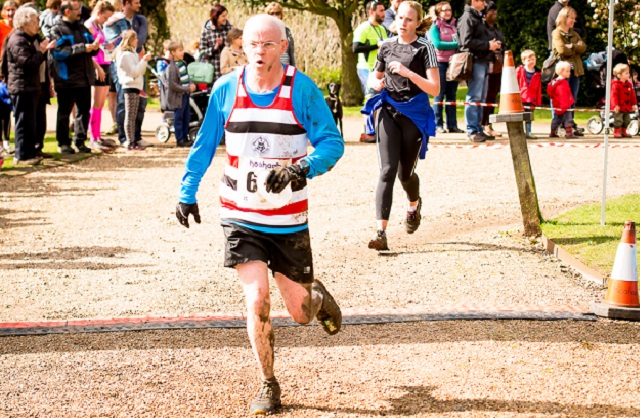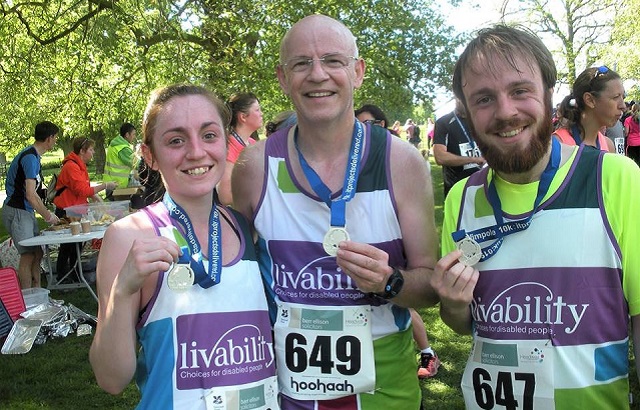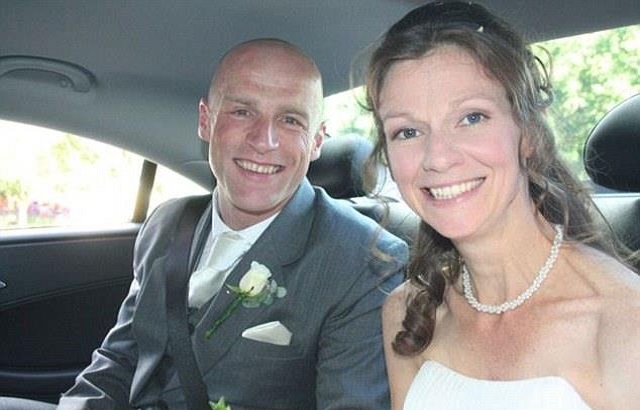

Blood clots are vital: they’re what stop us from losing too much blood from cuts and wounds. Yet when they happen in the wrong place inside the body, these small clots can have life-changing – and devastating - effects. All organs need a good supply of blood to work properly, and when a blood clot obstructs this flow it can cause major problems, such as a heart attack, stroke or vascular dementia.
Stroke: “A blood clot changed the way I think and speak”
Most strokes happen when a blockage — usually a blood clot — cuts off the blood supply to a part of the brain. The effects vary depending on where in the brain the blood clot forms: they can range from physical problems, like muscle weakness and difficulty with balance, to problems with speech, communication, and extreme fatigue.
David Swales is a technical accountant and a keen runner. He had a stroke in April 2016.
“In the weeks leading up to the stroke I got these episodes of vision problems. It turned out it was little bits of the clot breaking off.
“On the day I had my stroke, I’d run a race, a 10k cross country. I wanted to finish in under an hour, and I’d looked at my watch and thought — ‘I’m not going to make it’ — and I sprinted up the final hill. I finished in just under the hour, with three seconds to spare.

“When I was back at home in my kitchen I suddenly lost my vision. Everything was fuzzy and swimming and I couldn’t see anything. It cleared again after a few minutes. Four hours later, I realised I still couldn’t see at all to my left. That’s when I went to an out-of-ours doctor, who sent me straight to A&E.
“I had a CT scan, and it showed I’d had a stroke, with blood clots in two places. One was at the back of my brain, which caused the vision loss, which is permanent. And the other was in the centre of the brain, the thalamus, which is just above the brain stem. That’s caused all my other problems related to being able to think properly — speech problems, memory problems, and neurofatigue.
“There are days when I can hardly talk properly, particularly if I’m tired. My voice goes, my thinking goes. There are days when, at work, I don’t answer the phone, because I can’t. My colleagues will not ask me questions because they’ll know I’m struggling.
“But I’ve done things since my stroke that I never would have done before. I ran 1,000 miles last year. A year after my stroke, I ran the same race that I’d had my stroke after, and I finished quicker than I did the previous year.”

Funding stroke research
The BHF is one of the UK’s largest funders of stroke research.
One BHF-funded researcher, Dr Alistair Webb at the University of Oxford, is trying to find clues in stroke sufferers that will help to predict whether they are at risk of another.
“Despite major advances in stroke research in the past decade, strokes still occur in people like David when all the classic problems like cholesterol, heart problems and blood pressure are under control. With the support of the BHF, we are trying to identify and target new factors that cause stroke, such as variability in blood pressure, stiff arteries and irregular heart rhythms. By doing so, we can understand why strokes continue to occur in otherwise healthy people and hopefully stop others having to experience the difficulties that David has been through.”
Heart attack: “A blood clot gave me a heart attack the week before my wedding”
Most heart attacks happen when the inside of one or more of the coronary arteries become narrowed due to a gradual build-up of fatty deposits.
If a piece of this fatty material breaks off, a blood clot forms to try and repair the damage to the artery wall. If this clot builds and stops blood flowing to the heart, it causes a heart attack when part of the heart muscle is starved of blood and oxygen.
Melanie Mully had a heart attack in 2011, a week before she was due to get married.
“I was speaking to a friend on the phone. I wanted to check if she was still coming to the wedding — but I don’t remember actually doing that.
“Luckily, she sensed something was seriously wrong when I went completely silent, and she called 999 immediately.”
“The next thing my fiancée Kevin knew, the police were at the door with the paramedics, asking to see me. He had been oblivious to all this — he said I was chatting on the phone next door. Then he opened the door and I was lying on the floor.
“The paramedics were able to resuscitate me but they had to shock me six times as my heart had stopped beating.
“I was taken to hospital, and spent five days in an induced coma in intensive care. They tried to bring me round a couple of times, but I didn’t wake up properly until I was on the cardiac unit.
“I left hospital after three weeks, but my recovery — physically and emotionally — took a long time. I have always been relatively fit, and I have never been overweight. So the heart attack still doesn’t make sense to me. But now I have just had to come to terms with it and take the medicine. In the last couple of years I have taken everything on board and I am back on track. I know I am lucky to have this second chance at life.”

Beating heartbreak
Dr William Fuller and colleagues at the University of Glasgow are investigating new ways to protect heart muscle from injury after a heart attack.
When blood vessels supplying the heart become blocked during a heart attack, the heart is starved of blood and oxygen. When the blood flow returns, usually during a hospital procedure, , there is a release of toxic chemicals known as reactive oxygen species (ROS) which cause further damage to the heart muscle.
Dr Fuller’s group are investigating if a new drug can activate the heart to protect itself against ROS and if a drug can allow the heart to regain its function. The drug being assessed by the team in Glasgow is already being investigated in clinical trials for other conditions, which means if the work is successful it could be rapidly transitioned into patients.
“New treatments for coronary heart disease are urgently needed to save lives and reduce its medical, societal and economic impact. The exciting news is that early results from our research are really very promising. If we’re successful, we will only be a few years away from having a new way of treating people who have a heart attack.”
It’s all connected
Professor Joanna Wardlaw from the University of Edinburgh is studying the small blood vessels deep in the brain. Problems with these blood vessels can lead to strokes and vascular dementia. Her project is jointly funded by the BHF, the Stroke Association and Alzheimer’s Society.
Problems with the small blood vessels of the brain contribute to around 40 per cent of dementia cases.
“There is a lot going on in the brain that we don’t understand, but treating stroke and dementia as if they are completely different is a bit artificial, and we should look at them together."
The team will collect information from hospital records and perform thinking and memory tests on 2000 people after they have had a stroke. They will also collect biological samples (like blood) and perform scans that will help to identify chemicals that could act as markers for vascular dementia. The team will compare results from those who develop memory and thinking problems with those who don’t, using the results to try to work out what causes vascular dementia and how to predict those at risk of developing the condition.
More BHF Research
Ever wondered which animal has the most complex heart? Or how what you drink can affect your health? How about if you can die from a broken heart?
Our brightest and best life saving research is brought to you each week.



